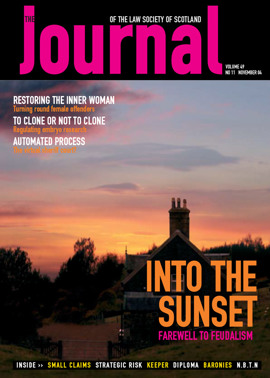An ethical minefield

Stem cell research has been the subject of one of the most ethically charged of debates. It has ignited fires in scientific, religious, legal, medical and political spheres. In the race for the US Presidency, Senator John Kerry recently used former actor, Christopher Reeve’s death as the impetus for a fresh attack on President Bush’s resistance to scientific research using human stem cells.
Stem cells are found in a number of places in the human body and can occur from the earliest stages of development (embryonic stem cells) to adulthood (adult stem cells). Many scientists believe that the most effective way of finding treatments for some diseases will be to carry out research on stem cells obtained from humans at various stages of development – including, controversially, very early embryos.
Bush has pressed the United Nations to ban all forms of human cloning, including cloning for research into cures for some of the world’s most debilitating conditions – ailments as diverse as cancer, diabetes, spinal paralysis, heart failure and Parkinson’s disease.
Christopher Reeve, the Superman actor turned medical campaigner, envisioned stem cell research as the passage to a world without disease. Reeve commented on this super-science at a conference last year: “We must err on the side of unfettered scientific inquiry if we are going to do the greatest good for the greatest number of people.” His enthusiasm was grounded in the search for a cure to his own condition: almost total paralysis, caused by a riding accident.
Internationally, stem cell research is constrained by various barriers of conflicting laws and regulations. The intensity of the debate over the wisdom of this type of research has made even the most liberal governments shy away from confronting the issue in a positive fashion. One of the few places making real progress is the UK, and more specifically, Scotland.
Although many quarters admire such progress, the field is still swamped with concerns. There are many countries, including the US, which are less positive about this branch of science and many individuals have serious reservations about it.
Science and morality
Forms of research into stem cells vary, and can involve cloning technology. However, cloning used in a laboratory setting for stem cell research does not involve reproductive cloning, cloning which intends to create living organisms which will reach maturity. Instead it involves human embryos being created by cell nuclear replacement (the technology used to create Dolly the sheep) rather than by fertilisation. Stem cells are then obtained from these embryos in the laboratory and closely studied to increase understanding of the development and course of disease.
The controversy surrounding this science lies in two main strands. First, there are those who believe that tampering with embryos at any stage of development is to destroy human life. Secondly, some are concerned that continued research into therapeutic cloning could allow cloning technology to “leak” into the laboratories of unscrupulous scientists who would use it for reproductive cloning. Some commentators have raised fears that designer babies could be created or human beings cloned.
However, the UK’s approach has been to argue that if we regulate this field thoroughly then the research will pose no such threats. UK law permits research on human embryos to be carried out only for specific purposes, and human embryo research in the UK is policed by the Human Fertilisation and Embryology Authority (HFEA) through its licensing scheme under the Human Fertilisation and Embryology Act 1990.
A legal and ethical framework
The HFEA receives applications from researchers and through its scheme establishes whether the project should be licensed or not. The HFEA cannot grant a licence unless it is satisfied that the use of human embryos is desirable or necessary for the purposes of research. Human reproductive cloning is illegal in the UK, and nobody in the UK is allowed to use cloning techniques to create a child.
The 1990 Act originally detailed a limited number of permitted purposes for research, including the increase of knowledge about the causes of miscarriage and congenital disease, and the promotion of advances in the treatment of infertility.
However, in 2001, new regulations introduced an extensive research regime. The justifications for research on human embryos were extended to include the increase of knowledge about the development of embryos; the increase of knowledge about serious disease; and the enablement of any such knowledge to be applied in developing treatments for serious disease.
Research proposals submitted to the HFEA have to establish that they will meet one of these purposes and also have to pass a set of rigorous tests set down by the HFEA. The process ensures that only legitimate projects are granted approval.
Researchers have to gain ethics approval from an ethics committee before even approaching the HFEA for an application. The HFEA Regulation Department then carries out peer reviews to assess compliance with a range of criteria including ensuring the candidates meet the requirements of the HFEA’s code of practice. Site visits are then conducted by HFEA regulation staff and independent scientific inspectors. All licensed projects are subject to rigorous monitoring for compliance with the terms of their licence.
Researchers have a responsibility to comply with HFEA regulations and licensing. To date, there has never been a case in the UK where the regulations have been breached. In such a scenario, accountability would fall squarely on the individual scientists involved, and also on the institutions for which they worked.
Expanding the research base
To date, the HFEA has only granted one licence for therapeutic cloning. The Newcastle Centre for Life is using its initial one year licence to develop the treatments for serious diseases including Alzheimer’s and Parkinson’s.
Professor Ian Wilmut and his team from the Roslin Institute, Lothian-based creators of Dolly the sheep, have recently applied for a licence. If it is granted, they will begin research next Easter to further understanding of motor neurone disease.
The Roslin research will involve cloning embryos with motor neurone disease, so that stem cells from these embryos can be studied more closely. Roslin’s scientists are keen to stress that there is no intention of producing cloned babies, as the embryos produced in the research will be destroyed after the experiments are complete. The aim is to improve understanding of the disease, which is difficult to study in sufferers as the key cells involved form part of the patients’ central nervous systems.
Economic potential
There are legal limitations on using intellectual property law to obtain monopolies on some medical advances. However if UK institutions are able to retain ownership of the IPR that comes in parallel with finding treatments for disease through this research, the implications from social and economic viewpoints could be enormous. Not only could new treatments radically improve our health and make savings to our healthcare systems but there is also massive potential for creating revenue streams by licensing out discoveries to other countries.
Gaining ownership of IPR in this area will not be straightforward and this industry is still an ethical minefield. Although UK laws are more liberal as far as permitting research is concerned, obtaining patent protection is still challenging and for some is considered unacceptable. Many companies and institutions are understandably reluctant to be seen as profiting from technology which is seen by some as unethical. At the same time, firms cannot be expected to invest the huge sums required unless their investments are properly protected.
What we can hope for is a firm international consensus on cloning – both reproductive and therapeutic. It is safe to say most people agree the UN should ban reproductive cloning worldwide. However, with such split opinion over therapeutic cloning, we are far from international political agreement on its future.
International stamp of approval or not, the UK is beginning to move forwards with therapeutic cloning, and the HFEA ensures it is stringently regulated by providing an excellent framework with the new licensing rules. At the moment, there is a very long way to go and the research is still in its early stages here. Given its strong background of excellence in life sciences, Scotland has the potential to be a world-leading centre for research in this field. If we do not rise to this challenge, Scotland will lose out from a share of a market which one day may be worth billions.
Carefully balancing the ethical and social concerns against the perceived benefits of stem cell research is one of the principal challenges now facing stem cell researchers and their advisers.
The legal community in Scotland needs to be prepared, informed and equipped to ensure that we get it right every step of the way.
Angus MacLeod is an associate with Wright Johnston & Mackenzie LLP (WJM), Glasgow and Edinburgh. He specialises in technology and intellectual property in the firm’s corporate core service group and his client list includes the Roslin Institute.
In this issue
- Drafting consumer contracts
- Virtual firms: transactional learning on the web
- Ignorantia juris: it's all Greek to me
- Sheriff Court Rules Council consultation paper
- The Clinical Trials Directive - a summary
- Guarding the inner sanctum
- Neighbours in the global village
- Family law: is it the path for you?
- From sunset to sunrise
- What next for conveyancing?
- An ethical minefield
- Shredding the evidence
- Robbing the poor?
- Our dynamic profession
- A wider angle
- Keep the eye on the ball
- A rough guide to becoming a partner
- Rediscovering hope
- Sharpen your pencils
- Significant other
- Too far or not enough?
- Chipping away the infringers?
- View from Holyrood
- Website reviews
- Book reviews
- The Registers and the Appointed Day
- Feudal law: not just a relic
- Birth of a register






